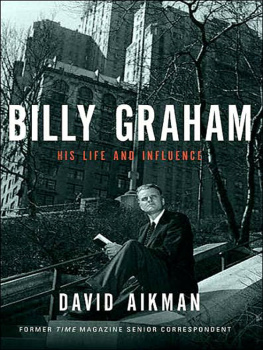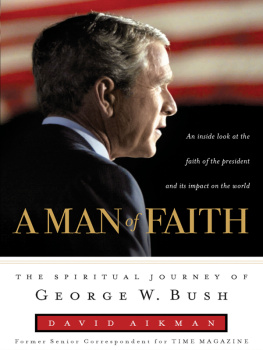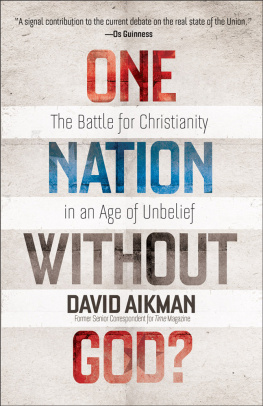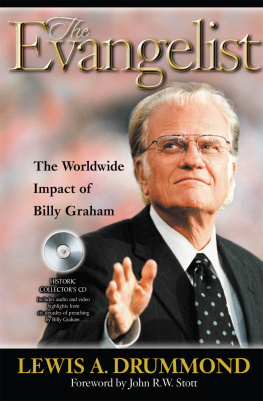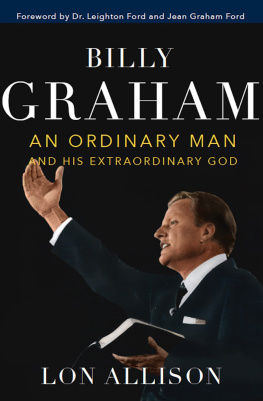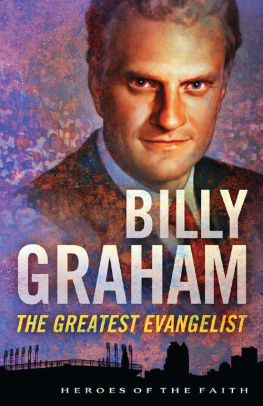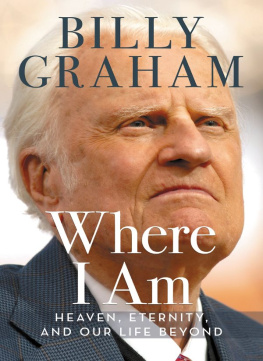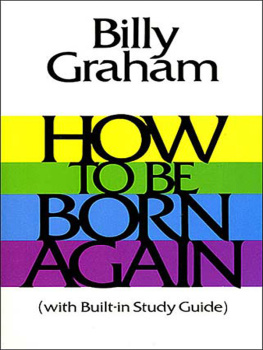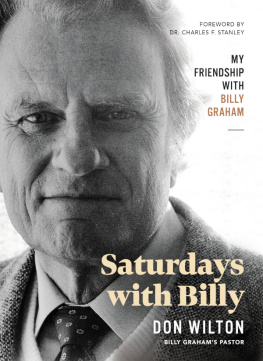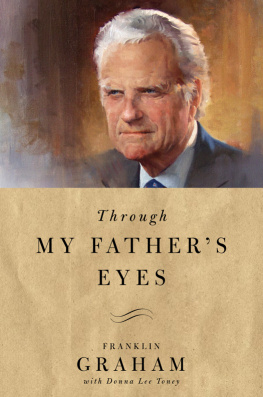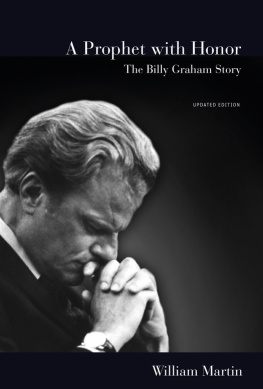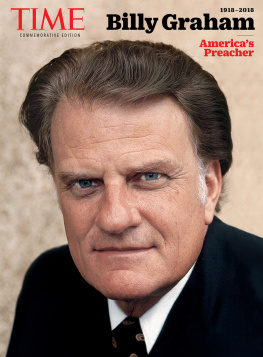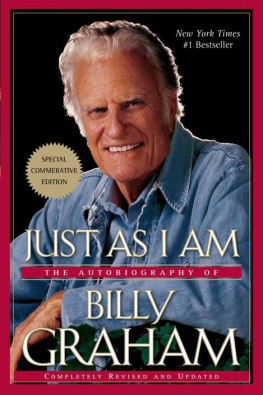BILLY GRAHAM
HIS LIFE AND INFLUENCE
OTHER BOOKS BY DAVID AIKMAN
Pacific Rim: Area of Change, Area of Opportunity
(Little, Brown and Company, 1986)
When the Almond Tree Blossoms, novel
(Word Publishing, 1993)
Hope: The Hearts Great Quest
(Servant Publications, 1995)
Great Souls: Six Who Changed the Century
(Word Publishing, 1998; paperback, Lexington Books, 2002)
Jesus in Beijing: How Christianity is Transforming China and
Changing the Global Balance of Power
(Regnery Publishing Inc., 2003; paperback, 2006)
Man of Faith: The Spiritual Journey of George W. Bush
(W Publishing Group, 2004)
QI, novel
(Broadman & Holman Publishers, 2005)
Also co-author of
Love China Today
(Tyndale House, 1978)
Gorbachev: An Intimate Biography
(New American Library, 1988)
Massacre in Beijing: Chinas Struggle for Democracy
(Warner Books, 1989)
See www.davidaikman.com for announcements of forthcoming books
BILLY GRAHAM
HIS LIFE AND INFLUENCE
DAVID AIKMAN

by David Aikman, 2007
All rights reserved. No portion of this book may be reproduced, stored in a retrieval system, or transmitted in any form or by any meanselectronic, mechanical, photocopy, recording, scanning, or otherexcept for brief quotations in critical reviews or articles, without the prior written permission of the publisher.
Published in Nashville, Tennessee by Thomas Nelson. Thomas Nelson is a trademark of Thomas Nelson, Inc.
Thomas Nelson, Inc. titles may be purchased in bulk for educational, business, fund-raising, or sales promotional use. For information, please e-mail SpecialMarkets@ThomasNelson.com.
All Scripture references are from the King James Version of the Bible (KJV).
Library of Congress Cataloging-in-Publication Data
Aikman, David, 1944
Billy Graham : his life and influence / David Aikman.
p. cm.
ISBN 978-08499-1702-8 (HC)
ISBN 978-159-555-137-5 (IE)
1. Graham, Billy, 1918 2. EvangelistsUnited StatesBiography. I. Title.
BV3785.G69A35 2007
269'.2092dc22
[B]
2007023819
Printed in the United States of America
07 08 09 10 11 QW 6 5 4 3 2 1
CONTENTS
T he nations pastor. Billy Graham would be a shoo-in for the job, if such a job existed. After all, he has held that position unofficially for decades already. Of course, Americans, who first settled this land precisely because they were fleeing government-run churches, would never agree to an official religious post along the lines of Britains archbishop of Canterbury or Irans ayatollah. But Billy Graham has been doing the job without need for the title for at least a quarter century, on hand for the major milestones of American life: the presidential inaugurations every four years, the scandals that have led occasionally to resignation or impeachment, the inevitable deaths of presidents, and the shocking and senseless national tragedies. He has been the great consoler, the eloquent unifier in hard-to-define adversity, the articulator of the troubling questions that tragedy invariably raises.
Slowly and somewhat unsteadily, Billy Graham took the national limelight once again after the September 11, 2001, terror attacks. At the September 14 memorial service broadcast live on national television from Washington National Cathedral, Graham articulated the burning question on everybodys mind more than any other: Why? But how do we understand something like this? he asked. Why does God allow evil like this to take place? As probably no other American could have done with as much credibility, Billy Graham assayed an answer. Acknowledging that many people doubtless were questioning God or were angry with God, he said, I want to assure you that God understands these feelings that you may have. Weve seen so much on our television and... on our radio stories that bring tears to our eyes and make us all feel a sense of anger. But God can be trusted, even when life seems at its darkest.
Grahams presence has seemed to be so comforting that no American state funeral or memorial service would seem complete without him. Even into his late eighties, when his activities have necessarily been scaled back, he has remained one of the most consistently admired of all Americans, as reflected in polls such as those by George Gallup Jr. In 2006, Billy Graham ranked among Gallups list of the top 10 most-admired men in the world for a record fiftieth time. What accounts for this consistent and longstanding favorable view? Could it be that Americans feel that in Graham is reflected their best self, perhaps even that Graham represents everything that is decent about America? Some may resent the religious righteven criticizing Grahams outspoken eldest son, Franklinand some may be suspicious of faith in the White House or anywhere else in the political arena. But Billy Graham himself? He seems to have attained a Mount Rushmorelike status, standing loftily above the fray of the major controversies of public life: a figure who symbolizes an acceptable, unthreatening religiosity.
Thats not to say, though, that Billy Grahams life and career have been without their controversies, nor that he has no detractors or people who have differed with him or his approach in a variety of arenas. The pages that follow will consider those controversies and the criticisms, weighing them against the enormous breadth of the worldwide impact he has had, to reachit is hopeda balanced and honest assessment of this man who started out as a humble preacher from rural America but went on to represent more than any other individual the face of Protestant Christianity, to Americans and ultimately to the whole world. Newsweek magazine, putting him in the context of the entire history of Christianity, called him one of the most formidable figures in the 2,000-year story of Christian evangelism.
For some evangelical Christians, though, the very fact that Graham is viewed as nonthreatening and is accepted by a majority of Americans is itself a problem. In their view, as Grahams life journey took him from the sometimes unappealing world of Protestant fundamentalism, and later from what came to be called neoevangelicalism (wags might in turn describe this as fundamentalism lite), he stopped being a bona fide evangelical altogether and crossed over into some sort of spiritual universalism. Evangelists, it has been understood from apostolic times, are not supposed to make peace with the world at all. Rather, they are to turn it upside down. Was Graham faithful throughout his life to this injunction? This is a topic that we will explore in greater detail in the following pages.
But whether Graham watered down the fiery evangelical faith of his early years or compromised with the spirit of the age, he has, simply put, been a colossus overshadowing our national life for more than half a century. He bestrode America at first like a train conductor, anxious to ensure that everyone was properly ticketed for the journey. Later, he became more the wise family uncle, counseling and consoling the nation in time of trouble. Former CBS news anchor Dan Rather put it this way: He stands with a handful of American religious leaders from the Great Awakening forward who helped define the country. And he did that in a particularly tumultuous time in our history, the last half of the twentieth century.
And yetand this is surely an arena where many Americans may be quite unaware of the extent of his impactGraham now belongs to the world. The experience of two American Protestant ministers who were in southern Sudan for a few weeks in the summer of 2002 tellingly illustrates how closely the rest of the world associates Graham with the preaching of the gospel. They told me that a suspicious Sudanese official had approached them at an airport demanding to know what they were in his country to do. Were evangelists, one replied. You mean like Billy Graham? the official asked. For this Sudanese bureaucrat, a Muslimas for thousands, perhaps millions, of people in foreign landsGraham is quite simply equated with Christianity and is regarded as the prototype evangelist. In Beijing, China, a large photograph of Billy Graham was the sole decorative element on the living room wall of the prominent evangelical Protestant house church leader, the late Yuan Xiangchen, also known by his English name Allen Yuan. Yuan held unregistered, and hence illegal, weekly meetings of believers in his apartment and was one of two Christian leaders from these house churches who met Graham when the evangelist visited China for the first time in 1988. For Yuan, the crucial element of the vast expanse of Grahams entire life ministry was the American evangelists trademark invitation to listeners to make a decision for Christ.
Next page
